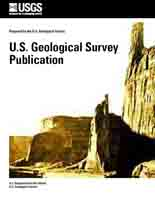Emergency assessment of potential debris-flow peak discharges, Coal Seam fire, Colorado
Links
- More information: USGS Index Page (html)
- NGMDB Index Page: National Geologic Map Database Index Page (html)
- Download citation as: RIS | Dublin Core
Abstract
These maps present the results of assessments of peak discharges that can potentially be generated by debris flows issuing from the basins burned by the Coal Seam fire of June and July 2002, near Glenwood Springs, Colorado. The maps are based on a regression model for debris-flow peak discharge normalized by average storm intensity as a function of basin gradient and burned extent, and limited field checking. A range of potential peak discharges that could potentially be produced from each of the burned basins between 1 ft3/s (0.03 m3/s) and greater than 5,000 ft3/s (>141 m3/s) is calculated for the 5-year, 1-hour storm of 0.80 inches (20 mm). The 25-year, 1-hour storm of 1.3 inches (33 mm). The 100- year, 1-hour storm of 1.8 inches (46 mm) produced peak discharges between 1 and greater than 8,000 ft3/s (>227 m3/s). These maps are intended for use by emergency personnel to aid in the preliminary design of mitigation measures, and the planning of evacuation timing and routes.
Suggested Citation
Cannon, S.H., Michael, J.A., Gartner, J.E., Rea, A.H., and Garcia, S.P., 2002, Emergency assessment of potential debris-flow peak discharges, Coal Seam fire, Colorado (Version 1.0): U.S. Geological Survey Open-File Report 2002-379, 1 Plate: 53.00 × 36.00 inches, https://doi.org/10.3133/ofr02379.
ISSN: 2331-1258 (online)
Study Area
| Publication type | Report |
|---|---|
| Publication Subtype | USGS Numbered Series |
| Title | Emergency assessment of potential debris-flow peak discharges, Coal Seam fire, Colorado |
| Series title | Open-File Report |
| Series number | 2002-379 |
| DOI | 10.3133/ofr02379 |
| Edition | Version 1.0 |
| Year Published | 2002 |
| Language | English |
| Publisher | U.S. Geological Survey |
| Contributing office(s) | Denver Federal Center, Geologic Hazards Science Center, National Geospatial Program |
| Description | 1 Plate: 53.00 × 36.00 inches |
| Country | United States |
| State | Colorado |
| Other Geospatial | Coal Seam fire |


